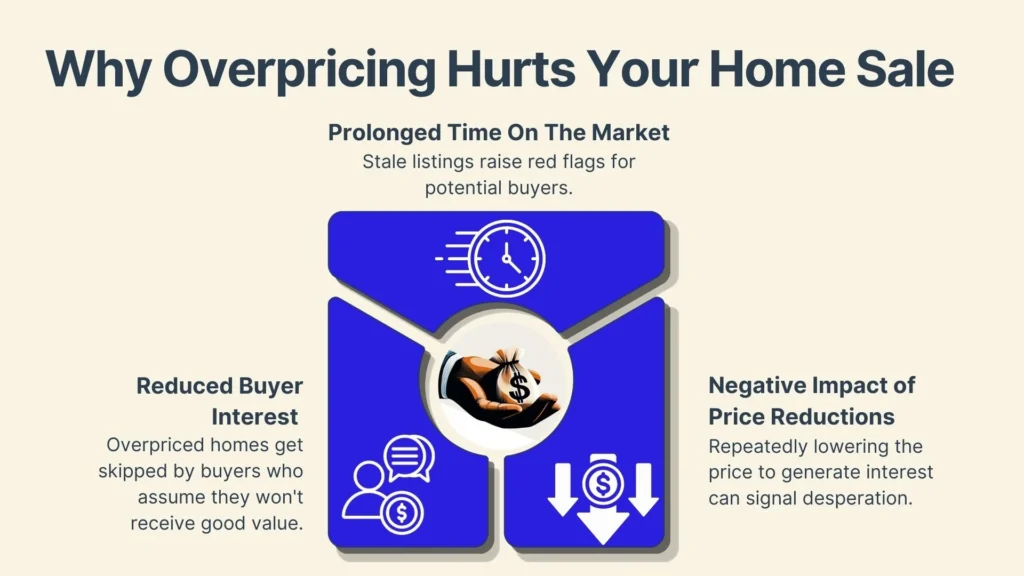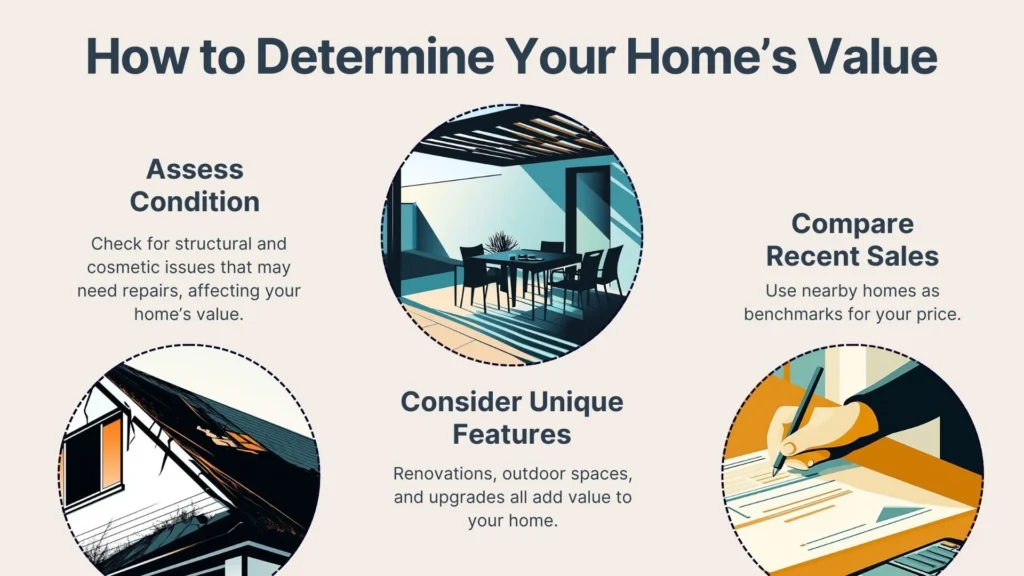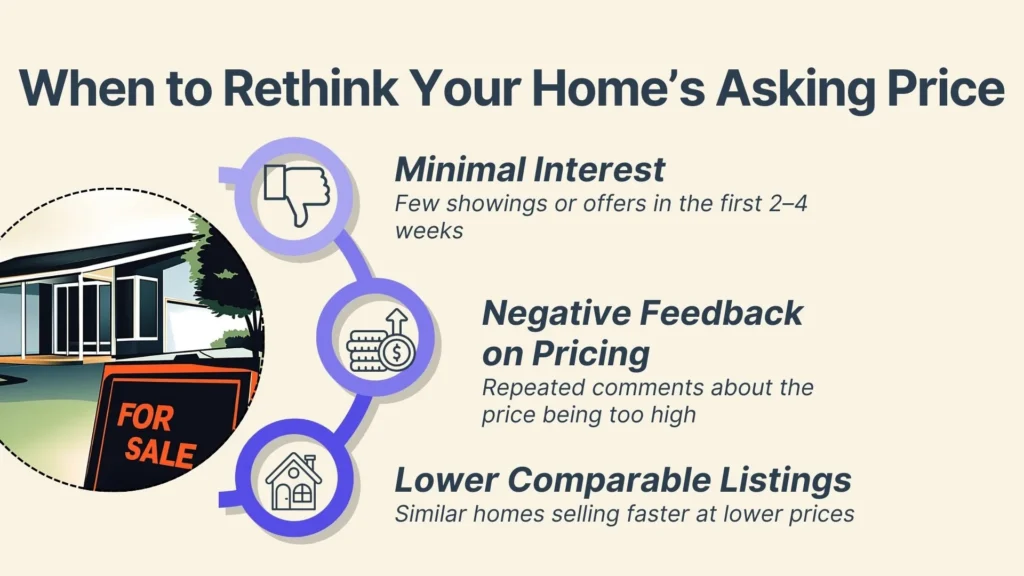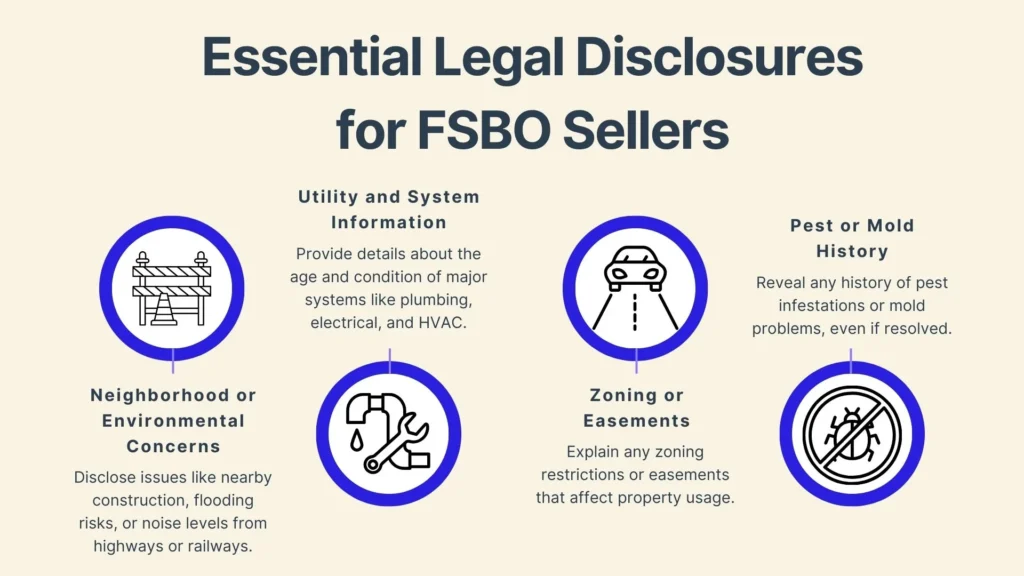Pricing your home correctly is one of the most important steps in the home-selling process, especially if you’re selling it as a For Sale By Owner (FSBO). Unlike working with a realtor, FSBO sellers have full control over pricing decisions, which can be both empowering and challenging.
Setting the right price ensures you attract buyers, sell your home within your desired timeframe, and maximize your profit. Keep reading this guide to learn the key steps to pricing your home accurately, researching the market, and preparing for a successful sale.
Why Accurate Pricing Is Crucial
Pricing your home accurately is essential for a successful sale. It directly impacts buyer interest, how long your home stays on the market, and your final sale price. For FSBO sellers, pricing is often cited as one of the most difficult tasks, with 17% identifying it as their biggest challenge.
Here’s a closer look at why accurate pricing matters:
Attracts Serious Buyers Quickly

The right price ensures your home stands out in a competitive market, drawing in serious buyers ready to make offers. Buyers often compare multiple listings within their price range, and a competitively priced home quickly becomes a top choice.
The first 30 days of a listing are critical because that’s when it gets the most visibility. Homes priced accurately during this period are more likely to receive offers. Additionally, many buyers – particularly first-time buyers, who make up 24% of the market – are pre-approved for a specific loan amount. Setting your price within their budget increases the likelihood of receiving offers.
Avoids The Stigma Of Overpricing
Overpricing your home can have long-term negative effects on your sale. Buyers may skip overpriced homes, assuming they won’t get good value for their money. On top of that, an overpriced home that sits unsold for too long will likely raise red flags for potential buyers who may question if there are hidden issues.
While it’s possible for you to drop the price to adjust to the market, be warned that repeated price reductions to generate interest can signal desperation, further reducing buyer confidence.
Ensures A Competitive Edge In The Market
Accurate pricing positions your home to compete effectively with similar properties. For example, in a seller’s market, competitive pricing can lead to bidding wars, potentially driving up the final sale price.
Today’s buyers are well-informed, with 51% finding homes online and comparing data from various sources. Pricing your home in line with their expectations increases your chances of closing the deal.
Additionally, homes priced accurately are more likely to sell quickly, keeping your listing fresh and desirable. A listing that lingers on the market for too long often loses its appeal.
Researching The Local Real Estate Market
Understanding your local market is critical to setting a realistic and competitive price for your home. FSBO sellers must invest time in gathering data and analyzing trends to ensure success.
Analyze Sales Of Similar Homes In The Past 3 To 6 Months
Start by looking at recently sold homes, often referred to as “comps,” in your area. Choose homes with comparable square footage, layout, and lot size – the closer the match, the more accurate your pricing. Keep those comps updated as the market changes quickly. Comps older than six months may not accurately reflect current conditions.
Lastly, pay attention to sale prices. Listing prices can be misleading – it’s final sale prices that reflect actual buyer demand.
Understand Current Market Trends And Their Impact
Market conditions dictate how aggressively you can price your home. Keep seasonal trends in mind as spring and summer are peak seasons for home sales – listing your home then can lead to faster transactions and higher prices.
Local economic factors can also affect the price you should set. For example, new businesses, infrastructure projects, or rising employment rates can increase buyer demand in your area.
Apart from local developments and the time of year, note if you’re setting your home’s price in a buyer’s or seller’s market. In a seller’s market, you can price slightly higher due to limited inventory. In a buyer’s market, pricing competitively is essential to attract interest. Use online platforms and local real estate reports to stay updated on these trends.
Evaluating Your Home's Worth
After understanding your market, the next step is to evaluate your home’s unique features and condition. Here are considerations when estimating your home’s value:
Conduct A Thorough Assessment Of Your Home's Condition

A realistic assessment of your home’s condition helps you determine its market value. Ensure your roof, foundation, and HVAC systems are in good condition. Major issues can significantly lower your home’s value.
Pay attention to cosmetic details – while they may seem minor, neglecting them may make potential buyers feel that the house isn’t well-maintained and may have other issues. Improvements need not be wildly expensive, as even some fresh paint, updated fixtures, and clean landscaping improve first impressions and perceived value. Addressing deferred maintenance, such as leaky faucets or worn-out flooring, can also reassure buyers and prevent lower offers.
Compare Your Home's Features With Recently Sold Properties
Unique features or upgrades can set your home apart from the competition. Highlight any renovations, such as an upgraded kitchen or bathroom, that add value. Outdoor spaces like landscaped yards, decks, or pools can also justify a higher asking price.
If your home lacks popular features, such as a garage or an open floor plan, be prepared to adjust your pricing accordingly to remain competitive.
Setting The Right Price For Your Home
With research and evaluation complete, it’s time to set a price that aligns with your goals and market conditions:
Consider Your Timeline And Financial Goals
Your pricing strategy should reflect your personal circumstances. If speed is a priority, pricing slightly below market value can attract multiple offers and lead to a faster sale. But if you have time, pricing at market value and waiting for the right buyer can help you achieve your financial goals.
Adjust Price Based On Home's Unique Features Or Upgrades
Pricing should reflect the true value of your home’s features. If your home has standout features, such as a modern kitchen or solar panels, consider pricing slightly above comparable properties. For homes with disadvantages, such as being near a busy street, competitive pricing can compensate for these factors and attract buyers.
Indicators It's Time To Adjust Your Price
Sometimes, even with careful planning, your initial price may not generate the desired interest. Knowing when to adjust is key to maintaining momentum. Here are some signs that you may need to make some changes:

Minimal Interest Or Offers Within The First Few Weeks
The first two to four weeks are critical. If your home hasn’t generated significant interest, reevaluate your price and adjust strategically. Compare your listing to similar homes that are selling and identify potential pricing gaps. A modest price reduction can reengage buyers and attract new interest.
Constructive Feedback From Potential Buyers
Buyer feedback during showings and open houses can provide valuable insights. If multiple buyers mention pricing as a concern, it may indicate your home is overpriced. Use feedback to make improvements, such as staging rooms differently or addressing minor cosmetic issues, to justify your current price.
Preparing For The Market
Before listing your home, ensure it’s ready to impress buyers. A well-prepared home not only justifies your asking price but also helps you stand out in a competitive market. Follow these tips to get your home ready for sale:
Ensure All Necessary Repairs And Improvements Are Made
Repairs and updates increase buyer confidence and help justify your price:

- Address major issues: Fix roof leaks, foundation problems, or outdated plumbing to avoid deal-breaking inspection reports.
- Focus on high-impact areas: Kitchens and bathrooms often have the highest return on investment. Simple updates, like replacing hardware or painting cabinets, can make a big difference.
- Boost curb appeal: First impressions matter. Mow the lawn, plant flowers, and pressure-wash driveways to create a welcoming exterior.
Stage Your Home To Highlight Its Best Features
Staging allows buyers to envision themselves living in your home. Start with decluttering and depersonalizing your home. Removing personal items, like family photos, creates a neutral space that makes it easier for buyers to picture how they would live in and decorate the rooms.
Maximize space with crafty furniture rearrangements to make rooms appear larger and more functional. For the finishing touches, use fresh flowers, throw pillows, and soft lighting to create a warm, inviting atmosphere.
Legal And Negotiation Readiness
Pricing and preparing your home are essential, but FSBO sellers must also be ready to handle legal requirements and negotiations:
Understand And Prepare Necessary Legal Disclosures
Transparency is critical in real estate transactions. Be upfront about issues that are commonly disclosed like roof age, past repairs, or known hazards (e.g., lead paint or asbestos) to avoid legal issues. Failure to disclose known problems can result in costly lawsuits or lost deals.
Develop A Strategy For Handling Offers And Negotiations
You’ll need a clear plan to manage offers and counteroffers, which always starts with setting limits. Decide on your minimum acceptable price and any terms you’re unwilling to compromise on, then make it a point to respond promptly. Fast replies keep buyers engaged and show you’re serious about selling.
Stay professional throughout the process. Keep negotiations focused on the facts to avoid emotional decisions that could derail the sale. By staying organized and prepared, you can confidently navigate this stage and close the deal successfully.
Conclusion
The right price is key to keeping your home competitive in the market. Setting a price accurately is critical to attracting buyers and closing the deal, but it doesn’t have to be stressful. With Propbox, you don’t have to navigate this alone. Our platform empowers FSBO sellers with AI-powered valuation tools, automated organization, and step-by-step guidance.
Skip the hefty commission fees, reduce the mental load, and sell your home faster while maximizing your profit. With the right approach, you’ll maximize your profit and move on to your next chapter with ease.
